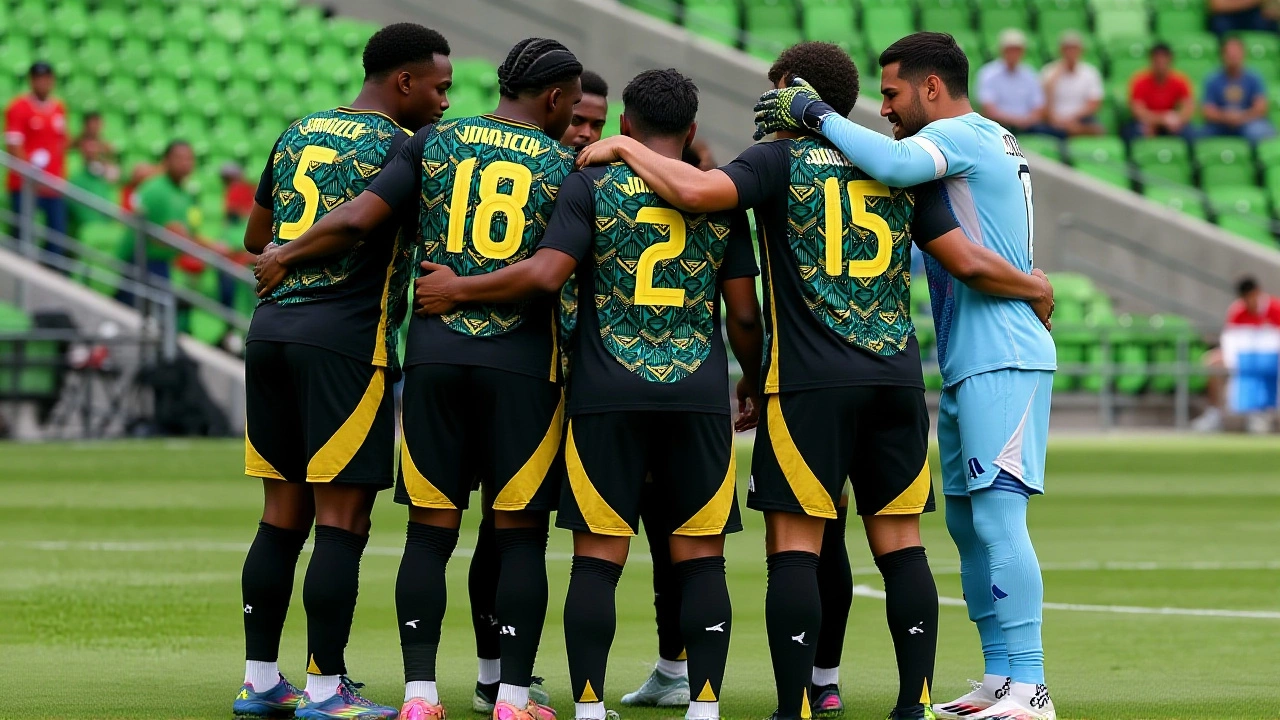Curaçao Makes History as Smallest Nation Ever to Qualify for Men's World Cup
 Nov, 21 2025
Nov, 21 2025
On a humid November night in Kingston, Jamaica, a nation of just 160,000 people changed football forever. Curaçao secured its first-ever men’s World Cup berth with a 0-0 draw against Jamaica at the National Stadium on November 18, 2025. The result wasn’t flashy, but it was monumental. Curaçao finished top of CONCACAF Group B with 12 points from six matches — three wins, three draws, zero losses — edging out Jamaica by a single point. For the first time in history, the smallest nation ever to qualify for a men’s World Cup will play on football’s biggest stage.
A Blue Wave That Defied the Odds
Curaçao didn’t win this match. They didn’t need to. What they needed was resilience. And they had it in spades. With the stakes sky-high, the islanders held firm under pressure, weathering Jamaica’s late attacks and surviving a pivotal moment in stoppage time. At 90'+6', Jamaican defender John Russell was shown a second yellow card for a 50/50 challenge with Curaçao’s Loadia, leaving Jamaica with ten men. But even then, the tension didn’t ease. The real hero? Goalkeeper Andre Blake. At the 382-second mark — just over six minutes into the match — he tipped over a powerful strike from Jamaica’s Floron. That save wasn’t just critical; it was symbolic. It was the moment Curaçao knew they could hold on.The final whistle, after 90'+11', sent waves of disbelief and joy through the small Curaçaoan contingent in the stands. Broadcasters on CBS Sports Golazo called it “a result that will resound in Curaçaoan history.” On YouTube, the highlights quickly went viral under the tag: “A blue wave is heading to the World Cup.” The island’s national team, dressed in their electric blue kits, had done what no one thought possible.
How Did They Get Here?
Curaçao’s journey wasn’t built on star power. There were no Premier League names on their roster. Instead, they relied on disciplined organization, tactical intelligence, and homegrown talent nurtured through local academies. Their six-game Third Round campaign was flawless: no losses, 12 points, a +10 goal difference. Meanwhile, Jamaica — a team that had qualified for the 2015 Gold Cup and reached the 2022 World Cup qualifying playoffs — stumbled at the final hurdle, losing only once but failing to capitalize on key chances.Trinidad and Tobago finished third with nine points, while Bermuda, winless and outscored 20-0, ended at the bottom. The group standings made one thing clear: Curaçao didn’t just sneak in — they dominated.
What’s more, they did it despite being the only team in the group without a single professional player from Europe’s top five leagues. Most of their squad plays in the Dutch second tier, the Caribbean Premier League, or in regional clubs. Yet their cohesion was undeniable. As one analyst noted on ESPN’s post-match breakdown: “They played like a team that knew this was their one shot — and they refused to let it slip.”

What Comes Next?
Curaçao won’t be in the 2026 World Cup just yet. They’ve earned a spot in the interconfederation playoff, scheduled for March 2026 across Guadalajara and Monterrey, Mexico. Their opponent remains unknown — likely a team from Asia, Africa, or Oceania. But history suggests this is no longer a long shot. Consider: Iceland (population 340,000) reached the 2018 World Cup. Cape Verde (550,000) and Jordan (1.1 million) have both competed in Africa and Asia qualifiers. But Curaçao? Smaller than all of them.“They’re not just a curiosity,” said former U.S. national team coach Bruce Arena in a post-match interview. “They’ve proven you can build a competitive team with limited resources — if you have culture, identity, and belief.”
Why This Matters Beyond the Pitch
This isn’t just about football. It’s about representation. Curaçao, a constituent country of the Kingdom of the Netherlands, sits in the southern Caribbean — a tiny dot on the map with no professional league of its own. Yet its national team has become a beacon for small nations everywhere. Children in Willemstad now dream of wearing the blue jersey in a World Cup stadium. Teachers in primary schools are using the match as a lesson in perseverance. The island’s government announced a public holiday on November 20, 2025, to celebrate.And the ripple effect? Other small nations — like Suriname, Guyana, or even the British Virgin Islands — are already asking: “If they can do it, why not us?”

The Legacy of a Single Draw
The match ended 0-0. But the story? It’s anything but. Curaçao didn’t score a goal in Kingston. But they scored something far greater: a place in history. They didn’t need a hat trick. They just needed to hold on. And they did.Frequently Asked Questions
How is Curaçao smaller than Iceland, which also made the World Cup?
Curaçao has an estimated population of 160,000, while Iceland had 340,000 when it qualified for the 2018 World Cup. That makes Curaçao nearly half the size of Iceland’s population — and smaller than any other nation ever to reach a men’s World Cup finals. Even Cape Verde (550,000) and Jordan (1.1 million) are significantly larger.
What’s the significance of Curaçao being part of the Kingdom of the Netherlands?
While Curaçao is an autonomous country within the Kingdom of the Netherlands, it fields its own national team in FIFA competitions, separate from the Netherlands. This allows it to compete independently despite its small size. Many Curaçaoan players have Dutch heritage or dual nationality, but they’ve chosen to represent the island — strengthening its identity on the global stage.
Who is Andre Blake, and why is he so important to this achievement?
Andre Blake, a Jamaican-born goalkeeper who plays for the Philadelphia Union in MLS, chose to represent Curaçao through heritage eligibility. His 6-minute save against Floron was the defining moment of the match. He kept a clean sheet in all three group wins and three draws — a crucial factor in Curaçao’s undefeated campaign. He’s now a national hero.
What happens if Curaçao loses the interconfederation playoff?
If Curaçao loses, they’ll be eliminated from the 2026 World Cup. But their qualification for the playoff alone is historic. Even if they don’t make it to the finals, they’ve already rewritten the record books. FIFA has acknowledged their achievement as a milestone for small nations, and they’re likely to receive increased funding and development support from CONCACAF.
How did Curaçao avoid losing any matches in the Third Round?
Curaçao played a disciplined, counter-attacking style under coach Richard Orlans, prioritizing defensive solidity over attacking flair. They drew four of their six matches — including the crucial 0-0 in Kingston — and won the other two by narrow margins. Their ability to grind out results against stronger teams like Jamaica and Trinidad and Tobago was the key to their success.
Will Curaçao have a chance to compete in future World Cups?
Yes — and that’s the real legacy. Their qualification proves that small nations can compete at the highest level with the right structure. CONCACAF has already signaled it will review its qualifying format to better support emerging teams. Curaçao’s success could inspire a new generation of Caribbean footballers to believe they belong on the world stage.